“Are you a cult? Is this musical based on a cult manga or anime?” I was half-surprised when an English-speaking, middle-aged press attendee asked this at the Attack on Titan: The Musical press conference. The answer would have been a Google away. Still, perhaps the woman’s confusion was to be expected in the first American run of a manga-adapted Japanese musical of Hajime Isayama‘s mega-hit shōnen manga Attack on Titan.
In this musical, the last of humanity isn’t safe in their birdcage. In a post-apocalyptic world of terrifying giants, known as Titans, humans survived behind large walls. One fateful day, their complacency is shattered when the Colossal Titan crushes a wall. One young boy, Eren Yeager, joins the warrior Survey Corps. Proud and defiant, he’ll slay the giants. That is the premise of The Attack on Titan: The Musical, a 2.5D musical production.
Anyone who read the Kodansha-published manga or watched its four-season anime adaptation (Wit Studio for its three seasons and MAPPA for its fourth) would know that a bounty of revelational twists happens beyond this premise. Attack on Titan: The Musical adapts the manga’s early chapters of its relatively simpler slish-and-slash days. It wouldn’t be an Attack on Titan musical without the aerial and sword-play of the Survey Corps. If you’re a neophyte with only an old-fashioned impression of Western musical theatre, don’t expect any tap-dancing giants. Do expect an opening Titan Ballad, composed of dancers producing the famous contorted, grotesque Titans’ physicality.
Despite an unspoken shadow over the production, the musical’s aerial stunts went without a hitch. Previously, a 2016 stage show was developed and then canceled due to an on-stage fatal fall of acrobat Kazutaka Yoshino during rehearsals.
The musical is directed and choreographed by breakdancing champion Go Ueki of the Spartanik Rockers, with a script by Masafumi Hata, music supervision by KEN THE 90, and lyrics by Kaori Miura. The musical originally premiered in Osaka and Tokyo in January 2023. Unless they had the eBay cash to buy the Japanese production’s Blu-ray, U.S. anime-manga consumers couldn’t access the musical.
Finally, U.S. fans were able to be in the room where it happened. The production sailed over to New York with its 35-member cast, the majority of reprisals from the original production, with English subtitles. The leading cast includes Kurumu Okamiya (The Garden of Words stage version) as Eren Yeager, Sara Takatsuki (Jujutsu Kaisen The Stage and also the voice of Anna in When Marnie Was There) as Mikasa Ackerman, Eito Konishi (Touken Ranbu The Stage) as Armin Arlert, and Ryo Matsuda (Tokyo Revengers Stage series, Touken Ranbu The Stage) as Levi, and Takuro Ohno (London Pacific Overtures) as Erwin. Some of the cast have credentials that include Broadway-based productions.
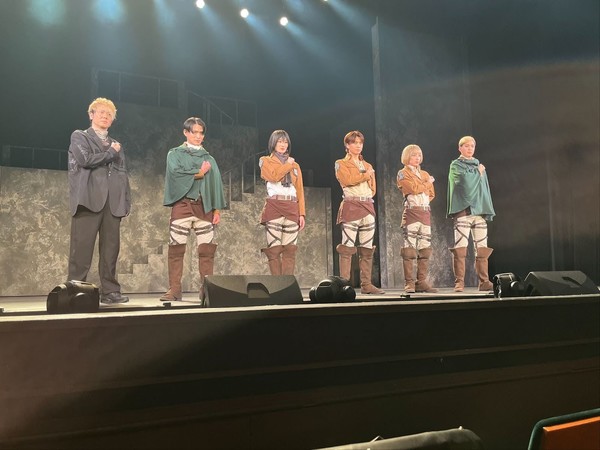
While Attack on Titan: The Musical contained distinctive idiosyncrasies from Western musical theatre, it landed among the New York City theatre district. Through the interpreter, Director Ueki said, “As an actor, New York has Broadway, and every actor wants to be on Broadway. For 25 years, I have been seeing different shows [on Broadway]… It is nice that we get to connect to the [NYC] audience and fans of the show.”
Attack on Titan: The Musical was staged at Manhattan New York City Center, which, to clarify, is not to be mistaken as a Broadway-qualified theatre house, but it mounts Encores! revivals of Broadway-staged musicals. Confession time: Being that I saw Maury Yeston’s Titanic: The Musical previously at New York City Center, I kept screwing the title up as “Attack on Titanic: The Musical.”
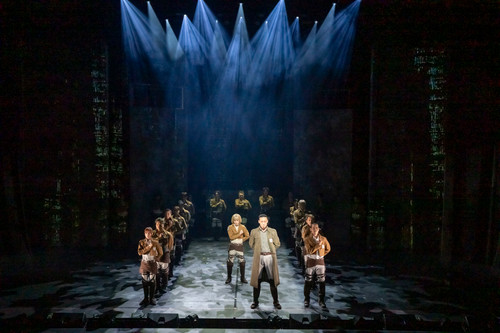 | 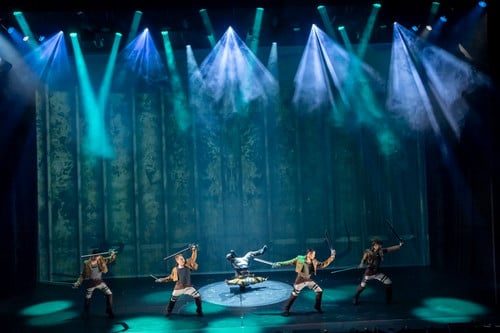 | 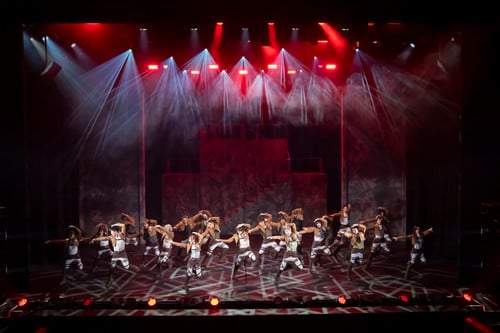 |
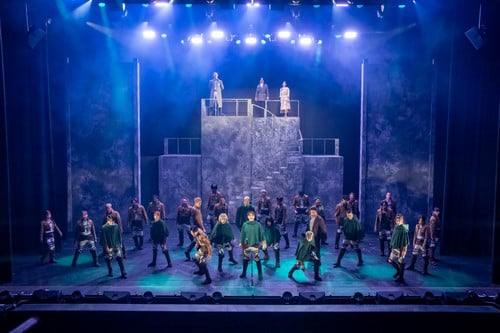 | 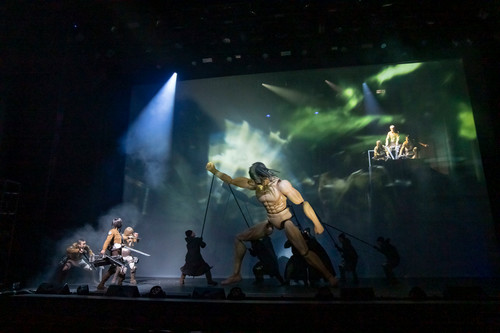 | 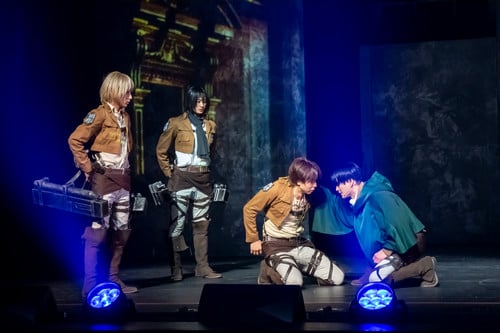 |
One fan attendee inquired why the stage iteration of Mikasa wore a black scarf, to which the actress Takatsuki made the distinction between the anime’s red coloring and the original black-and-white manga–and the musical is faithful to Isayama’s manga.
The press performances displayed Ohno’s Erwin singing a prayer for his fellow soldiers as Levi flies into action, the militant Survey Corps marching, high-wire stunts, puppetry, whirling locational projections, and intensive breakdance ballet. For me, the balloon head-puppet of the notorious Colossal Titan was reminiscent of Spider-Man: Turn Off The Dark.
The Titan Puppet Design is credited to Art Studio Takuto LTD. with Titan Balloon Production credited to B.O.S-Toybox. “There are a lot of Titans, and especially the named Titans that are, you know, special Titans,” Ueki said of the stage giants. “We wanted to make sure that they are expressed in different ways. It could be the projection, puppet, or balloon, but we made sure that each was expressed and portrayed differently.” Stephen Sondheim’s Into The Woods giant this is not.
In addition, Levi’s actor Matsuda treats the legacy of playing a fan-favorite Ackerman as if it’s lightweight. He said, “Right now, I’m the only living person who has played Levi with the vertical maneuvering gear and fly. I feel that responsibility and resolve to do a good job so that fans of Attack on Titan will appreciate the stage.”
I regret that the Q&A press conference allowed no time to squeeze through my question: “Describe how breakdancing and Attack on Titan go together?” When invited to sit mezzanine at the two-hour, intermission-free dress rehearsal among the press and New York City Center staff, I watched as a ballad of giants (actors in bodysuits before a backdrop of a field, signifying the Titans’ towering sizes) performed their contorted movements and hustled into concert-esque formations, Armin singing a Disney-like “I-want” ballad, a mother singing a lullaby to her children as she is lifted into a Titan’s greedy jaws, a breakdancer spinning on his head for a minute, and the Survey Corps singing and dancing a hip-hop number.
When I glanced at my note-taking while processing the post-performance buzz, I saw “Levi doing his Spider-Man thing.” I also somehow scrawled and underlined: “Levi & Erwin married.”
The NYC premiere of Attack on Titan: The Musical arrived at a time when more manga-adapted musicals frequent the West. Two Frank Wildhorn-composed works made their London premieres: the recently closed-down English-language Your Lie In April: The Musical and last year’s English-language Death Note: The Musical. In a streaming example, the 2.5D Demon Slayer: The Stage now has its part 1 production available in the U.S. on Crunchyroll.
Attack on Titan: The Musical is one just one of the numerous branches of the Attack on Titan franchise. A compilation film of the anime finale Attack on Titan Final Season THE FINAL CHAPTERS will open in theaters on November 8th.
Ueki said, “To live in this beautiful and cruel world means so much to me, to bear this string of feelings on my back, I hope it helps us beyond the borders and to reach beyond the world.” He hopes the musical will inspire its “audience the courage to go up against hardships.”
Attack on Titan: The Musical played at the New York City Center (131 W. 55th Street) until October 13.



Leave a Comment